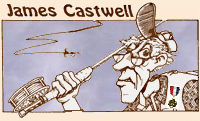|
It starts when he gets a fly rod and reel as a gift from his wife. He has been a
good husband, fine father, takes the family camping each spring and they all
enjoy a few meals of campfire trout. The limit is five per day and he never goes
over that. Sound like a wonderful scene? Let me add, for years he had been
using a spinning rod and bait. He doesn't know how to use the fly rod yet.
A couple of questions here. There are not a lot of trout where he fishes, the game
department is a bit behind on regulations and in fact, the stream is over-fished.
But he doesn't know that. Yet.
Now, how do we feel about this picture? Should he be taught to fly-cast? And
in the process taught that just because the limit is five, perhaps under some situations,
that may be too many? Maybe, catch and release would be a good thing too? But,
for right now, how do we really feel about this guy? Think about it, haven't many
of us been right there? Does that change how we feel about him now?
Let's move on a bit here. Lets say he learns to fly-cast, understands catch and
release but still keeps his legal five trout a day. Now how do we feel about him?
Has he broken any laws, done anything wrong? Oh yes, I forgot . . . he fishes
downstream with buggers. Now what?
And now he joins TU and FFF, teaches casting for a fly shop and becomes a
licensed guide. But on vacation with his family in a pristine remote virgin wilderness
area keeps a few trout for a stream-side dinner with his wife and kids. Is he
ethically wrong?
At this point I say he is not. As he has learned and been taught the rules of the
environment he has also accepted the responsibility for his behavior. Trout fishing
is a blood sport. C&R included, a few are going to die, period.
Having accepted that, what do we think of him when he decides to only fish dry-flies
so the trout mostly get hooked in the lip or corner of the jaw? What now indeed? He
decides that it is more sporting for him to catch a trout that rises than just having
one grab the fly and pull. How do we feel about him now? Because he only fishes
dries, does that mean we should? Are we wrong to use nymphs and streamers and
bugger flies? I think not. None of us are bound or should be influenced by the
actions of others. We are only bound and responsible for the knowledge we have,
or choose to have.

The bait fisher is not wrong. Until that is, he learns that the water he fishes is in
trouble and he keeps on doing it. Practicing catch and release can be wrong
when it is overdone to the detriment of the resource; when the number of releases
becomes the major game. That is wrong. We are wrong anytime we go against the
knowledge we possess at any given moment.
We can be wrong too when we judge others by our standards; those standards
we have developed by accumulating knowledge over a span of time. Information
becomes knowledge, add experience and ethics develop, the result becomes
wisdom. With wisdom comes responsibility. No one is immune. ~ James Castwell
|



